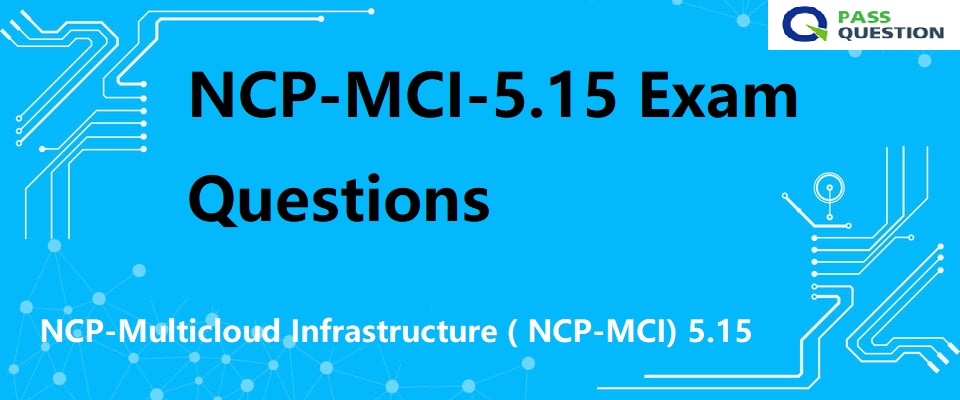NCP-MCI-5.15 Exam Questions - NCP-Multicloud Infrastructure ( NCP-MCI) 5.15
In order to help you pass Nutanix Certified Professional - Multicloud Infrastructure (NCP-MCI) 5.15 Exam, PassQuestion NCP-MCI-5.15 Exam Questions provide all the exam objectives to help you write your test easily,PassQuestion guarantees your passing of Nutanix NCP-MCI-5.15 exam at your first try. PassQuestion NCP-MCI-5.15 Exam Questions will introduce you to the core logic of a variety of topics to ensure that you not just learn, but you also understand different technologies and subjects. We assure that studying with our NCP-MCI-5.15 Exam Questions will adequately prepare you for the NCP-MCI-5.15 exam.

Nutanix Certified Professional - Multicloud Infrastructure (NCP-MCI) 5.15 Exam
The Nutanix Certified Professional - Multi Cloud Infrasturture (NCP-MCI) certification validates your skills and abilities in deploying, administering, and troubleshooting Nutanix AOS in the Enterprise Cloud. Successful candidates are able to deploy and administer Nutanix AOS nodes, blocks and clusters; and can use Prism Element to monitor, manage, troubleshoot, and administer AHV hosts and virtual machines.
NCP-MCI-5.15 Exam Details
Number of Questions: 75
Question Format: Multiple Choice
Time Limit: 120 minutes
Language: English, Japanese, Simplified Chinese
Price: The cost is USD $199 per attempt
NCP-MCI-5.15 Exam Sections
SECTION 1 – NUTANIX ENTERPRISE CLOUD CONCEPTS
- Define and differentiate features present in Acropolis, Prism (Element and Central), and AHV
SECTION 2 – MANAGING A NUTANIX CLUSTER
- Manage node operations in a Nutanix cluster
- Given a scenario, deploy ROBO sites
SECTION 3 – SECURING A NUTANIX CLUSTER
- Given a scenario, configure RBAC
- Install SSL certificates
- Explain authentication and password management
- Explain Data-at-Rest Encryption (DARE) functionality
SECTION 4 – NETWORKING
- Given a scenario, configure networking
- Describe AHV networking components and configuration settings
- Describe AHV managed versus unmanaged networks
- Describe AHV Bond Modes
SECTION 5 – VM CREATION AND MANAGEMENT
- Identify tools and methods for migrating a VM
- Create and deploy VMs
- Given a scenario, modify VM configuration
- Given a scenario, configure Affinity rules
- Explain live migration
SECTION 6 – HEALTH MONITORING AND ALERTS
- Given a scenario, conduct a basic analysis of performance and health of the cluster and VMs
- Configure cluster monitoring
SECTION 7 – DISTRIBUTED STORAGE FABRIC
- Recognize components of storage constructs and the data path of snpshots, clones, etc.
- Identify methods for creating a storage container and how to configure deduplication, compression, and erasure coding on
- Nutanix containers
SECTION 8 – ACROPOLIS STORAGE SERVICES
- Define and configure Nutanix Volumes
- Define Nutanix Files use cases
SECTION 9 – DATA RESILIENCY
- Given a scenario, configure VM High Availability
- Given a scenario, differentiate failover processes, including disk failure, CVM failure, and node failure related to replication factor
- Describe VM data path redundancy
SECTION 10 – DATA PROTECTION
- Given a scenario, configure protection domains
- Describe Leap availability zones
SECTION 11 – PRISM CENTRAL
- Describe and differentiate Prism Element and Prism Central
- Identify methods for viewing information about VMs, clusters, hosts, disks, and storage containers
- Identify methods for creating and monitoring performance graphs, alerts, and statistics
SECTION 12 – LIFECYCLE OPERATIONS
- Given a scenario, recognize processes to start, stop, and expand a cluster
- Given a scenario, demonstrate how to start and shut down a node in a cluster and how to eject a node from a cluster
- Perform upgrades
- Install, upgrade, and reclaim licenses
Comments
Post a Comment